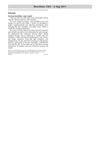 September 1983 in “Journal of The American Academy of Dermatology”
September 1983 in “Journal of The American Academy of Dermatology” Experts discussed hair care, genetic hair defects, hair loss treatments, nail surgery, lupus treatments, skin infections, and cosmetic allergies.
 January 2019 in “Springer eBooks”
January 2019 in “Springer eBooks” Acne is linked to inflammation and insulin resistance, and is associated with various syndromes that require different treatments.
 January 2024 in “Clinical, cosmetic and investigational dermatology”
January 2024 in “Clinical, cosmetic and investigational dermatology” Dermatologists should customize cosmetic treatments for dark-skinned patients to minimize risks and complications.
 98 citations,
May 2008 in “British Journal of Dermatology”
98 citations,
May 2008 in “British Journal of Dermatology” There are many treatments for permanent hair loss disorders, but their effectiveness varies and there's no clear best option.
 44 citations,
November 1998 in “Australasian Journal of Dermatology”
44 citations,
November 1998 in “Australasian Journal of Dermatology” Accurate diagnosis is key for treating different kinds of hair loss, and immune response variations may affect the condition and treatment results.
 1 citations,
April 2010 in “Expert Review of Dermatology”
1 citations,
April 2010 in “Expert Review of Dermatology” The document concludes that early diagnosis and treatment are crucial for managing rare hair loss disorders and that more research is needed to improve treatment strategies.
 53 citations,
November 1992 in “Mayo Clinic Proceedings”
53 citations,
November 1992 in “Mayo Clinic Proceedings” HIV can cause unusual and severe skin problems that are hard to treat.
 65 citations,
November 2016 in “Journal of The American Academy of Dermatology”
65 citations,
November 2016 in “Journal of The American Academy of Dermatology” The document concludes that early recognition and treatment of primary cicatricial alopecia is crucial to prevent permanent hair loss.
 1 citations,
June 2012 in “Actas Dermo-Sifiliográficas”
1 citations,
June 2012 in “Actas Dermo-Sifiliográficas” Early and aggressive treatment of scarring alopecia is important to prevent further hair follicle damage.
 January 2009 in “Springer eBooks”
January 2009 in “Springer eBooks” The document concludes that treating skin conditions should include psychological care and a multidisciplinary approach is essential for effective management.
 24 citations,
August 2013 in “Facial Plastic Surgery Clinics of North America”
24 citations,
August 2013 in “Facial Plastic Surgery Clinics of North America” Hair restoration surgery can have complications; success depends on patient education, careful planning, and proper execution.
December 2020 in “The journal of investigative dermatology/Journal of investigative dermatology” Papulopustular rosacea is an inflammatory skin condition treatable with lifestyle changes and medications.
 March 2024 in “Ukraïnsʹkij žurnal dermatologìï, venerologìï, kosmetologìï”
March 2024 in “Ukraïnsʹkij žurnal dermatologìï, venerologìï, kosmetologìï” Topical retinoids are important for treating acne effectively and safely.
 1 citations,
May 2015 in “Primary Health Care”
1 citations,
May 2015 in “Primary Health Care” Effective acne treatment varies by type, with topical and oral medications showing strong evidence, and patient education and support are crucial.
 August 2011 in “Reactions Weekly”
August 2011 in “Reactions Weekly” A man with lung cancer had skin and eye side effects from erlotinib but continued treatment with symptom improvement.
87 citations,
March 2013 in “Expert Review of Anticancer Therapy” Afatinib often causes skin problems that need proactive management.
 126 citations,
October 1983 in “Journal of The American Academy of Dermatology”
126 citations,
October 1983 in “Journal of The American Academy of Dermatology” Isotretinoin effectively treats severe acne and similar conditions, but has common, mostly reversible side effects, requiring careful patient monitoring.
42 citations,
May 2009 in “Contraception” The oral contraceptive with ethinyl estradiol and chlormadinone acetate is effective in treating moderate acne.
 18 citations,
August 2011 in “Clinical Drug Investigation”
18 citations,
August 2011 in “Clinical Drug Investigation” Low-dose isotretinoin combined with pulsed azithromycin cleared acne in most patients, with mild side effects.
 13 citations,
September 2011 in “American Journal of Clinical Dermatology”
13 citations,
September 2011 in “American Journal of Clinical Dermatology” The oral contraceptive ethinylestradiol/chlormadinone acetate is effective in reducing acne and improving other skin conditions related to high androgen levels.
 April 2023 in “The journal of investigative dermatology/Journal of investigative dermatology”
April 2023 in “The journal of investigative dermatology/Journal of investigative dermatology” EGFR deficiency causes significant changes in skin cells and hair follicles.
26 citations,
February 1978 in “Journal of Pediatric Surgery” Long-term TPN in children can cause zinc deficiency, leading to health issues.
 5 citations,
February 2013 in “Expert Review of Dermatology”
5 citations,
February 2013 in “Expert Review of Dermatology” New acne treatments include combination creams, advanced retinoids, and light therapies, focusing on safety and patient adherence.
 24 citations,
November 2016 in “Molecular Medicine Reports”
24 citations,
November 2016 in “Molecular Medicine Reports” Hormonal imbalances, often indicating conditions like PCOS, are common in women with hard-to-treat acne, and a treatment approach addressing these imbalances may be needed.
 37 citations,
January 2013 in “Postepy Dermatologii I Alergologii”
37 citations,
January 2013 in “Postepy Dermatologii I Alergologii” Isotretinoin effectively reduces acne but causes dry skin, higher skin pH, more redness, and hair loss.
 86 citations,
July 2012 in “British journal of dermatology/British journal of dermatology, Supplement”
86 citations,
July 2012 in “British journal of dermatology/British journal of dermatology, Supplement” There may be a connection between Frontal Fibrosing Alopecia and Lichen Planus Pigmentosus, and more research is needed to confirm this.
 June 2011 in “Oncology times”
June 2011 in “Oncology times” Dr. Mario Lacouture recommends preventive and specific treatments for skin side effects caused by EGFR inhibitors to improve patients' quality of life.
 1 citations,
April 2018 in “The journal of investigative dermatology/Journal of investigative dermatology”
1 citations,
April 2018 in “The journal of investigative dermatology/Journal of investigative dermatology” Oral tofacitinib significantly improves lichen planopilaris symptoms without adverse effects.
 5 citations,
January 2018 in “Springer eBooks”
5 citations,
January 2018 in “Springer eBooks” Acne in dark skin is influenced by environmental factors and can lead to hyperpigmentation, with various treatment options available.
November 2022 in “Journal of the Endocrine Society” Correcting vitamin D and progesterone deficiencies can significantly improve hair loss, acne, and BPH symptoms.

























